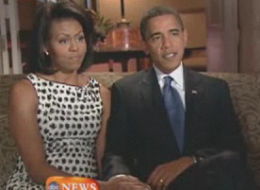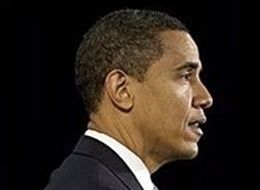Let the 21st Century Begin. Yes, many of us feel this way now that Obama is the president.
"Obama must take the difficult step of initiating the process for war crimes prosecutions of men such as Dick Cheney"
Nov. 6, 2008 | Sherman Alexie, novelist and poet
1. Yes, it's historic and incredible that a black man is president of the United States. But, dang it, it's just as important that a black woman is the first lady. Think about it. Jackie O! Lady Bird Johnson! And Michelle Obama in her Gap dresses! Please don't discount the cultural power of the first lady. I am very excited to see how Michelle Obama also revolutionizes the White House.
2. How many Republicans watched the footage of the Obama and McCain gatherings Tuesday night and noticed the incredible differences? The Obama crowds were racially, culturally, sartorially, rhythmically and age diverse. The McCain crowds were, well, they were very blond. How will Republicans address this imbalance? Maybe thousands of young Republicans will become high school and elementary school teachers in poor and inner-city neighborhoods, while Republican political leaders will demand and help create massive funding for poor and inner-city schools. Of course, I'm kidding. Republicans will do no such thing. But they should adopt a revolutionary educational platform.
3. Jesse Jackson wept Tuesday night. And they were tears of joy and grief. That man was standing beside MLK Jr. when he was assassinated. Jesse Jackson has earned those tears.
Enjoy this story?
Buzz up!
More
* Buzz up!
* Digg
* Facebook
* StumbleUpon
* Reddit
4. Stevie Wonder and Bruce Springsteen have performed for and with Obama. So aren't you absolutely excited about who will perform at the inauguration parties? Here's hoping Beyoncé, Tim McGraw, Kanye West, Death Cab for Cutie, the Dixie Chicks and the Harlem Boys Choir perform "People Get Ready."
5. I hereby order that "mandate" immediately be stricken from all the dictionaries and vocabularies of every Democrat in the country. That dirty word has no place in a democracy. That said, feel free to use the phrase, "Wow, we kicked some ass."
6. Thank God for Tina Fey and the power of political art.
Greil Marcus, author and journalist
I walked out of Northrop Auditorium Tuesday night after Bob Dylan's concert on the campus of his erstwhile alma mater, the University of Minnesota. The second number of the night was "The Times They Are A-Changin'," a song I never liked. On Tuesday night it moved slowly, crawling like a snake, all 44 years since it first appeared loaded into it, as if its real subject was what it means to wait. The last song was "Blowin' in the Wind." (I remember very clearly the first time I heard it on the radio. "Kinda erstatz," said Barry Franklin, my best friend and radio cruising partner; we were still in high school.) "I was born in 1941, the year they bombed Pearl Harbor. I've been living in darkness ever since," Dylan said to introduce the song, or as a goodbye, or, as he hadn't spoken before, as a hello. "But it looks like things are going to change now." At the end of the stage he stepped out from behind his electric organ and did a jig.
I feel as if I'm living in a new world and an old country, where all of its best words, down the centuries, are flesh. Or, as Barry Franklin put it last night, "I feel like I've died and gone to America."
Joan Blades, co-founder MoveOn.org
This election is about much more than who won and who lost. It's about our culture changing, becoming more inclusive and embracing our diverse citizenry. It's about courage and dreams winning out over fear. It's about coming together to reject the politics of the past and instead deciding to build the kind of nation we want for ourselves and our children.
What happened Tuesday can be the start of a profound change in our country, the goals we set, the ways we operate, and how we measure success. My most profound hope is that we become a more family-friendly nation that is compassionate, just and fair to all its people.
I am co-founder of MomsRising, and in that role I will work tirelessly to continue mobilizing moms and everyone who has a mom, all over the country, so we take advantage of this opportunity to advance paid sick days and family leave, flexible work, after-school programs, healthcare for all kids, and realistic and fair wages.
We did something remarkable Tuesday, but our work isn't done. The challenges we're facing are great, and the obstacles to progress won't disappear overnight. We all have to remain active and engaged if we are to realize the promise of yesterday's election.
Dan Savage, author and sex advice columnist
Tuesday night I was overjoyed.
But Wednesday morning, reading the papers and listening to the news on the radio, my boyfriend and I -- we're boyfriends in the USA, husbands in Canada -- sat at our kitchen table and had the exact same discussion we had the morning after the 2004 election: When the hell are we moving to Canada?
The anti-gay politicking that goes on in this country is a bit like a dog whistle: Straight people can't hear it, but it drives gay people absolutely around the bend. The importance of Obama's victory can't be overstated; I'm as moved as anyone else. But the passage of anti-gay marriage amendments in Arizona, Florida and, most heartbreakingly of all, California (and with overwhelming support from African-American voters), along with the passage of an anti-gay adoption amendment in Arkansas, left us both feeling shell-shocked, betrayed and angry.
Todd Gitlin, professor of journalism and sociology at Columbia University
New York exults. Don't say, "Well, what did you expect?" When strangers embrace and high-five on upper Broadway ("Yes we did!"), when church bells ring in Harlem at 2 in the morning, when 125th Street clogs up, as do Brooklyn streets, and celebrants dance on the roofs of taxis, when confetti rains down on the northwest Bronx, this is astonishing -- a popular festival that's unprecedented, maybe since VJ day in 1945. We've entered a new world.
It's not, God knows, a world that will stay exultant or one that'll be easily or quickly "fixed." In fact, it won't be fixed. We have a president-elect who, true to his Niebuhrian roots, knows that it can't be fixed -- knows the difference between improving and fixing. But it can be galvanized, and, yes, in some measure redeemed. In what measure? That depends on Obama's adroitness (the campaign promises much); on his ability to keep his tremendous base of the professional classes, minorities and women mobilized and deployed against the forces that will continue to block his initiatives (Yes we did it once! and will have to do it again!); on the wisdom of Democrats; on whether some Republicans can be peeled away from their kamikaze party; and, as always, on the unpredictable.
Let the 21st century begin. Finally.
Robert Dallek, author, presidential historian
Obama's victory represents a landmark moment in American history. His election was the result of national alienation from the George W. Bush presidency; indeed, the election may be considered a referendum on Bush's failed policies on Katrina, Iraq, the environment and the economy. Obama's understanding that the country wanted change and wished for an inspirational voice that promised a turn toward more constructive action was also a principal part of his success. I believe that historians will look back on 2008 as the end of the Reagan conservative era and the start of a new period of progressive federal activism.
If Obama succeeds in putting across economic and social reforms that change the national landscape, I think he will gain a place in the pantheon of exceptional presidents. Like Teddy Roosevelt, Wilson, FDR, Truman, JFK, LBJ and Reagan, Obama has the chance to be remembered as an innovative leader who advanced the national well-being in difficult times.




